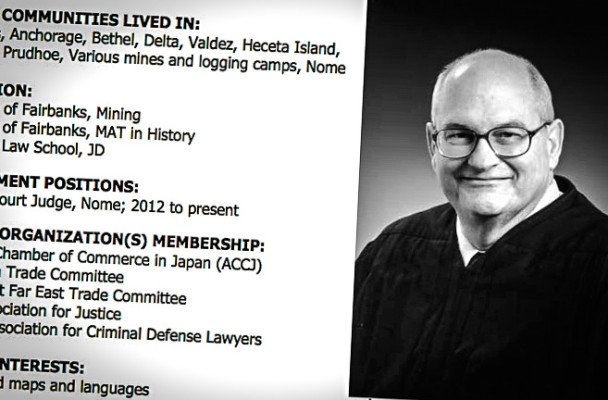
When Tim Dooley was seeking a judicial appointment, he noted that he had taken an unconventional route to the bench.
He’d shot at bears and wolves who threatened men working on the Yukon River pipeline, he wrote in his application for appointment.
He fought forest fires and shoveled coal at a power plant.
He was a ranch hand and a miner before he passed the bar exam.
Dooley said the rough language and straight talk he became accustomed to in his pre-lawyer life gave him perspective. In a December court hearing, he said his choice of words helped him build rapport and trust with clients, according to the Alaska Dispatch News.
But now, that language has gotten him in trouble with the Alaska Commission on Judicial Conduct, which says that some of the words Dooley used in court were damaging to victims and witnesses.
The commission has censured the judge – and asked him to take sensitivity training – because of his remarks from the bench.
There was, for example, the August 2014 domestic violence felony trial, during which he asked jurors if they could hear the testimony of the victim. “I’m sorry folks,” he said to jurors, “but I can’t slap her around to make her talk louder.”
There was the November 2013 hearing, when he was sentencing someone for sexually abusing a 14-year-old girl and observed: “This was not someone who was, and I hate to use the phrase, ‘asking for it.’ There are girls out there that seem to be temptresses. And this does not seem to be anything like that.”
On May 29 of that same year, during another sentencing hearing, Dooley said: “Has anything good ever come out of drinking other than sex with a pretty girl?”
A few months later, during a civil trial, Dooley declared: “I also have a medieval Christianity that says if you violate an oath, you’re going to hell. You all may not share that, but I’m planning to populate hell.”
Concerns about Dooley’s comments were first brought to the attention of the state’s Commission on Judicial Conduct in late 2013, less than a year after his appointment.
The state’s judicial code of conduct says a judge “shall act without bias or prejudice and shall not manifest, by words or conduct, bias or prejudice based upon race, color, sex, religion, national origin, disability, age, marital status, changes in marital status, pregnancy, parenthood, sexual orientation, or social or economic status.”
The commission said Dooley’s statements “adversely reflect on the integrity of the Judiciary in general” and were “undignified and discourteous to witnesses, litigants and sexual violence victims.”
In hearings that took place over two years, Dooley apologized for some of his actions and tried to provide context for others.
In one hearing, in December, he said the insensitive statements resulted from him “going off script” while on the bench, according to the Alaska Dispatch News, which reported:
Dooley apologized for each comment during the disciplinary hearing. He wrote in a statement to the commission that his May 29 comment “was wrong for me to say especially in view of the fact that sex offenders were present in the gallery.”
During that hearing, Dooley’s attorney, Bill Satterberg, argued that the court system was partly to blame, having not provided adequate training or support staff for the new Superior Court judge.
The commission required Dooley to be formally assigned a judicial mentor to work with him for 12 months.
Dooley, the commission said, should also “avail himself of further training . . . in the areas of gender sensitivity, cultural awareness, domestic violence and interaction with pro se litigants in both civil and criminal matters,” the commission said in its official order.
The punishment fell short of a stronger suspension, in part because Dooley had apologized and shown remorse, according to court documents.
The commission’s ruling was upheld last week by the Alaska Supreme Court.
Dooley was appointed to the Nome Superior Court on March 5, 2013, by then-Gov. Sean Parnell , R. He had previously been an applicant for the Fairbanks Superior Court, according to the Alaska Judicial Council.
In a biographical statement for his appointment, he talked about the perspective he gained from decades of working some of the toughest jobs Alaska had to offer:
“I came to Alaska in 1967 and worked almost every scut job imaginable – setting choker in logging camps in Southeast, fighting forest fires, roughnecking on drilling rigs, laboring in mines and on the Pipeline, and commercial fishing.
“I was born in Africa and have spent a lot of time in the Third World where people do not have honest and honorable courts, but settle their disputes with fire and butcher. Because of that, it is a strange experience to hear Americans who are angry about law, lawsuits and lawyers. They don’t know what they have.”
In December, Dooley spoke of the challenges in transitioning from private practice as a lawyer to an appointment on the bench.
He has “quit going off script,” he said, and added that he regretted causing trouble for the “wonderful people” at the Nome court.
(c) 2016, The Washington Post · Cleve R. Wootson Jr.


